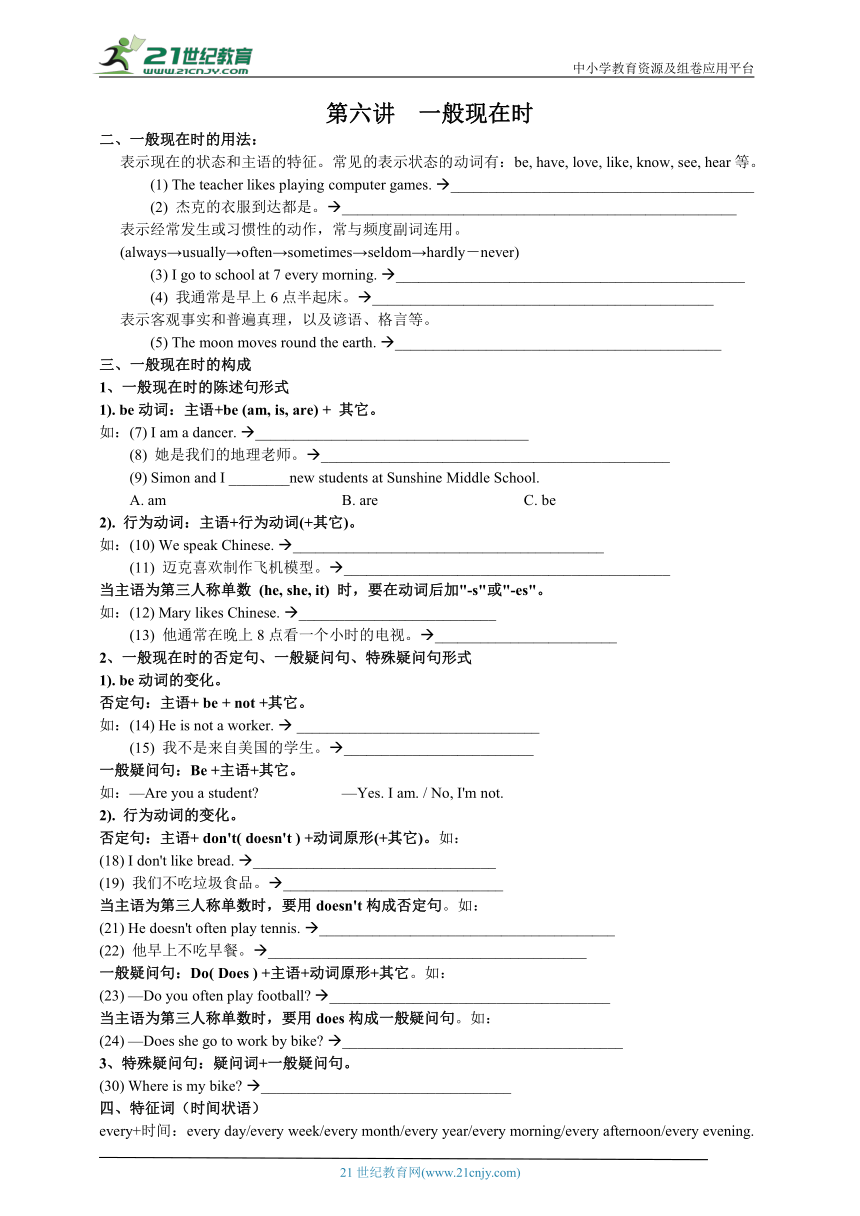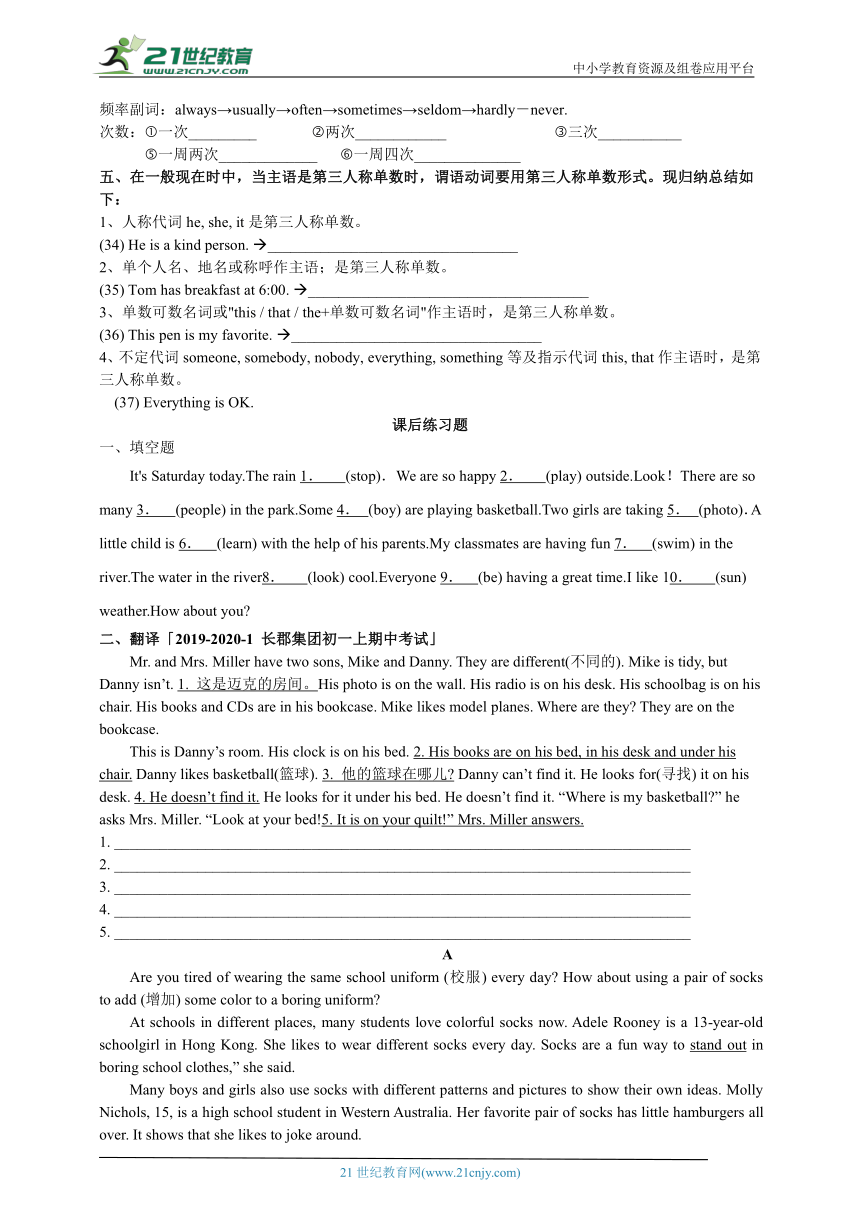【寒假学案】2024年人教版初一英语寒假教材学案 第六讲一般现在时 学案(含答案)
文档属性
| 名称 | 【寒假学案】2024年人教版初一英语寒假教材学案 第六讲一般现在时 学案(含答案) |  | |
| 格式 | doc | ||
| 文件大小 | 409.7KB | ||
| 资源类型 | 试卷 | ||
| 版本资源 | 人教新目标(Go for it)版 | ||
| 科目 | 英语 | ||
| 更新时间 | 2023-12-21 13:45:16 | ||
图片预览


文档简介
中小学教育资源及组卷应用平台
第六讲 一般现在时
二、一般现在时的用法:
表示现在的状态和主语的特征。常见的表示状态的动词有:be, have, love, like, know, see, hear等。
(1) The teacher likes playing computer games. ________________________________________
(2) 杰克的衣服到达都是。____________________________________________________
表示经常发生或习惯性的动作,常与频度副词连用。(always→usually→often→sometimes→seldom→hardly-never)
(3) I go to school at 7 every morning. ______________________________________________
(4) 我通常是早上6点半起床。_____________________________________________
表示客观事实和普遍真理,以及谚语、格言等。
(5) The moon moves round the earth. ___________________________________________
三、一般现在时的构成
1、一般现在时的陈述句形式
1). be动词:主语+be (am, is, are) + 其它。
如:(7) I am a dancer. ____________________________________
(8) 她是我们的地理老师。______________________________________________
(9) Simon and I ________new students at Sunshine Middle School.
A. am B. are C. be
2). 行为动词:主语+行为动词(+其它)。
如:(10) We speak Chinese. _________________________________________
(11) 迈克喜欢制作飞机模型。___________________________________________
当主语为第三人称单数 (he, she, it) 时,要在动词后加"-s"或"-es"。
如:(12) Mary likes Chinese. __________________________
(13) 他通常在晚上8点看一个小时的电视。________________________
2、一般现在时的否定句、一般疑问句、特殊疑问句形式
1). be动词的变化。
否定句:主语+ be + not +其它。
如:(14) He is not a worker. ________________________________
(15) 我不是来自美国的学生。_________________________
一般疑问句:Be +主语+其它。
如:—Are you a student —Yes. I am. / No, I'm not.
2). 行为动词的变化。
否定句:主语+ don't( doesn't ) +动词原形(+其它)。如:
(18) I don't like bread. ________________________________
(19) 我们不吃垃圾食品。_____________________________
当主语为第三人称单数时,要用doesn't构成否定句。如:
(21) He doesn't often play tennis. _______________________________________
(22) 他早上不吃早餐。__________________________________________
一般疑问句:Do( Does ) +主语+动词原形+其它。如:
(23) —Do you often play football _____________________________________
当主语为第三人称单数时,要用does构成一般疑问句。如:
(24) —Does she go to work by bike _____________________________________
3、特殊疑问句:疑问词+一般疑问句。
(30) Where is my bike _________________________________
四、特征词(时间状语)
every+时间:every day/every week/every month/every year/every morning/every afternoon/every evening.
频率副词:always→usually→often→sometimes→seldom→hardly-never.
次数:一次_________ 两次____________ 三次___________
一周两次_____________ 一周四次______________
五、在一般现在时中,当主语是第三人称单数时,谓语动词要用第三人称单数形式。现归纳总结如下:
1、人称代词he, she, it是第三人称单数。
(34) He is a kind person. _________________________________
2、单个人名、地名或称呼作主语;是第三人称单数。
(35) Tom has breakfast at 6:00. _____________________________________
3、单数可数名词或"this / that / the+单数可数名词"作主语时,是第三人称单数。
(36) This pen is my favorite. _________________________________
4、不定代词someone, somebody, nobody, everything, something等及指示代词this, that作主语时,是第三人称单数。
(37) Everything is OK.
课后练习题
一、填空题
It's Saturday today.The rain 1. (stop).We are so happy 2. (play) outside.Look!There are so many 3. (people) in the park.Some 4. (boy) are playing basketball.Two girls are taking 5. (photo).A little child is 6. (learn) with the help of his parents.My classmates are having fun 7. (swim) in the river.The water in the river8. (look) cool.Everyone 9. (be) having a great time.I like 10. (sun) weather.How about you
二、翻译「2019-2020-1 长郡集团初一上期中考试」
Mr. and Mrs. Miller have two sons, Mike and Danny. They are different(不同的). Mike is tidy, but Danny isn’t. 1. 这是迈克的房间。His photo is on the wall. His radio is on his desk. His schoolbag is on his chair. His books and CDs are in his bookcase. Mike likes model planes. Where are they They are on the bookcase.
This is Danny’s room. His clock is on his bed. 2. His books are on his bed, in his desk and under his chair. Danny likes basketball(篮球). 3. 他的篮球在哪儿 Danny can’t find it. He looks for(寻找) it on his desk. 4. He doesn’t find it. He looks for it under his bed. He doesn’t find it. “Where is my basketball ” he asks Mrs. Miller. “Look at your bed!5. It is on your quilt!” Mrs. Miller answers.
1. ____________________________________________________________________________
2. ____________________________________________________________________________
3. ____________________________________________________________________________
4. ____________________________________________________________________________
5. ____________________________________________________________________________
A
Are you tired of wearing the same school uniform (校服) every day How about using a pair of socks to add (增加) some color to a boring uniform
At schools in different places, many students love colorful socks now. Adele Rooney is a 13-year-old schoolgirl in Hong Kong. She likes to wear different socks every day. Socks are a fun way to stand out in boring school clothes,” she said.
Many boys and girls also use socks with different patterns and pictures to show their own ideas. Molly Nichols, 15, is a high school student in Western Australia. Her favorite pair of socks has little hamburgers all over. It shows that she likes to joke around.
In my hometown, I can buy socks from many stores. But they can be expensive. Luckily here in China, I find nice socks at good prices in cute stores along the street. They are wonderful gifts for my friends in Sydney when I go back!
46. What does the writer think of the school uniform
A. Different. B. Colorful C. Boring.
47. Where is the writer now
A. In the UK. B. In Australia. C. in China
48. What does the underlined part “stand out” mean (意思是)
A.站出来 B.引人注目 C. 拒不妥协
49. From the passage, we can infer (推断) that __________.
A. all of the schoolgirls in Hong Kong love to wear different socks every day
B. Molly Nichols likes hamburgers best
C. the writer finds some nice socks in China are not expensive
50. Where can you find the passage
A. In a science book. B. In a teen magazine. C. In a story book.
参考答案
1.stops 2.to play 3.people 4.boys 5.photos 6.learning 7.swimming 8.looks 9.is 10.sunny
1.This is Mike’s room.
2.他的书在他床上,桌子里和椅子下。
3.Where is his basketball
4他找不到它。
5.米勒夫人回答:“它在你的被子上。”
47-50CCBCB
21世纪教育网 www.21cnjy.com 精品试卷·第 2 页 (共 2 页)
HYPERLINK "http://21世纪教育网(www.21cnjy.com)
" 21世纪教育网(www.21cnjy.com)
第六讲 一般现在时
二、一般现在时的用法:
表示现在的状态和主语的特征。常见的表示状态的动词有:be, have, love, like, know, see, hear等。
(1) The teacher likes playing computer games. ________________________________________
(2) 杰克的衣服到达都是。____________________________________________________
表示经常发生或习惯性的动作,常与频度副词连用。(always→usually→often→sometimes→seldom→hardly-never)
(3) I go to school at 7 every morning. ______________________________________________
(4) 我通常是早上6点半起床。_____________________________________________
表示客观事实和普遍真理,以及谚语、格言等。
(5) The moon moves round the earth. ___________________________________________
三、一般现在时的构成
1、一般现在时的陈述句形式
1). be动词:主语+be (am, is, are) + 其它。
如:(7) I am a dancer. ____________________________________
(8) 她是我们的地理老师。______________________________________________
(9) Simon and I ________new students at Sunshine Middle School.
A. am B. are C. be
2). 行为动词:主语+行为动词(+其它)。
如:(10) We speak Chinese. _________________________________________
(11) 迈克喜欢制作飞机模型。___________________________________________
当主语为第三人称单数 (he, she, it) 时,要在动词后加"-s"或"-es"。
如:(12) Mary likes Chinese. __________________________
(13) 他通常在晚上8点看一个小时的电视。________________________
2、一般现在时的否定句、一般疑问句、特殊疑问句形式
1). be动词的变化。
否定句:主语+ be + not +其它。
如:(14) He is not a worker. ________________________________
(15) 我不是来自美国的学生。_________________________
一般疑问句:Be +主语+其它。
如:—Are you a student —Yes. I am. / No, I'm not.
2). 行为动词的变化。
否定句:主语+ don't( doesn't ) +动词原形(+其它)。如:
(18) I don't like bread. ________________________________
(19) 我们不吃垃圾食品。_____________________________
当主语为第三人称单数时,要用doesn't构成否定句。如:
(21) He doesn't often play tennis. _______________________________________
(22) 他早上不吃早餐。__________________________________________
一般疑问句:Do( Does ) +主语+动词原形+其它。如:
(23) —Do you often play football _____________________________________
当主语为第三人称单数时,要用does构成一般疑问句。如:
(24) —Does she go to work by bike _____________________________________
3、特殊疑问句:疑问词+一般疑问句。
(30) Where is my bike _________________________________
四、特征词(时间状语)
every+时间:every day/every week/every month/every year/every morning/every afternoon/every evening.
频率副词:always→usually→often→sometimes→seldom→hardly-never.
次数:一次_________ 两次____________ 三次___________
一周两次_____________ 一周四次______________
五、在一般现在时中,当主语是第三人称单数时,谓语动词要用第三人称单数形式。现归纳总结如下:
1、人称代词he, she, it是第三人称单数。
(34) He is a kind person. _________________________________
2、单个人名、地名或称呼作主语;是第三人称单数。
(35) Tom has breakfast at 6:00. _____________________________________
3、单数可数名词或"this / that / the+单数可数名词"作主语时,是第三人称单数。
(36) This pen is my favorite. _________________________________
4、不定代词someone, somebody, nobody, everything, something等及指示代词this, that作主语时,是第三人称单数。
(37) Everything is OK.
课后练习题
一、填空题
It's Saturday today.The rain 1. (stop).We are so happy 2. (play) outside.Look!There are so many 3. (people) in the park.Some 4. (boy) are playing basketball.Two girls are taking 5. (photo).A little child is 6. (learn) with the help of his parents.My classmates are having fun 7. (swim) in the river.The water in the river8. (look) cool.Everyone 9. (be) having a great time.I like 10. (sun) weather.How about you
二、翻译「2019-2020-1 长郡集团初一上期中考试」
Mr. and Mrs. Miller have two sons, Mike and Danny. They are different(不同的). Mike is tidy, but Danny isn’t. 1. 这是迈克的房间。His photo is on the wall. His radio is on his desk. His schoolbag is on his chair. His books and CDs are in his bookcase. Mike likes model planes. Where are they They are on the bookcase.
This is Danny’s room. His clock is on his bed. 2. His books are on his bed, in his desk and under his chair. Danny likes basketball(篮球). 3. 他的篮球在哪儿 Danny can’t find it. He looks for(寻找) it on his desk. 4. He doesn’t find it. He looks for it under his bed. He doesn’t find it. “Where is my basketball ” he asks Mrs. Miller. “Look at your bed!5. It is on your quilt!” Mrs. Miller answers.
1. ____________________________________________________________________________
2. ____________________________________________________________________________
3. ____________________________________________________________________________
4. ____________________________________________________________________________
5. ____________________________________________________________________________
A
Are you tired of wearing the same school uniform (校服) every day How about using a pair of socks to add (增加) some color to a boring uniform
At schools in different places, many students love colorful socks now. Adele Rooney is a 13-year-old schoolgirl in Hong Kong. She likes to wear different socks every day. Socks are a fun way to stand out in boring school clothes,” she said.
Many boys and girls also use socks with different patterns and pictures to show their own ideas. Molly Nichols, 15, is a high school student in Western Australia. Her favorite pair of socks has little hamburgers all over. It shows that she likes to joke around.
In my hometown, I can buy socks from many stores. But they can be expensive. Luckily here in China, I find nice socks at good prices in cute stores along the street. They are wonderful gifts for my friends in Sydney when I go back!
46. What does the writer think of the school uniform
A. Different. B. Colorful C. Boring.
47. Where is the writer now
A. In the UK. B. In Australia. C. in China
48. What does the underlined part “stand out” mean (意思是)
A.站出来 B.引人注目 C. 拒不妥协
49. From the passage, we can infer (推断) that __________.
A. all of the schoolgirls in Hong Kong love to wear different socks every day
B. Molly Nichols likes hamburgers best
C. the writer finds some nice socks in China are not expensive
50. Where can you find the passage
A. In a science book. B. In a teen magazine. C. In a story book.
参考答案
1.stops 2.to play 3.people 4.boys 5.photos 6.learning 7.swimming 8.looks 9.is 10.sunny
1.This is Mike’s room.
2.他的书在他床上,桌子里和椅子下。
3.Where is his basketball
4他找不到它。
5.米勒夫人回答:“它在你的被子上。”
47-50CCBCB
21世纪教育网 www.21cnjy.com 精品试卷·第 2 页 (共 2 页)
HYPERLINK "http://21世纪教育网(www.21cnjy.com)
" 21世纪教育网(www.21cnjy.com)
同课章节目录
